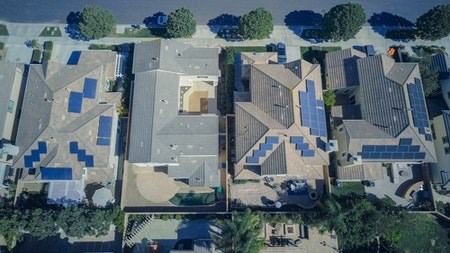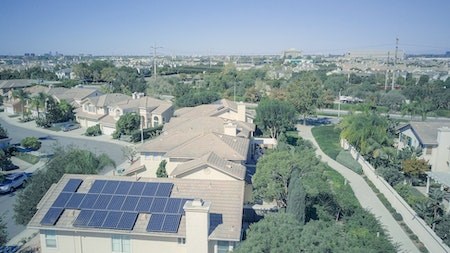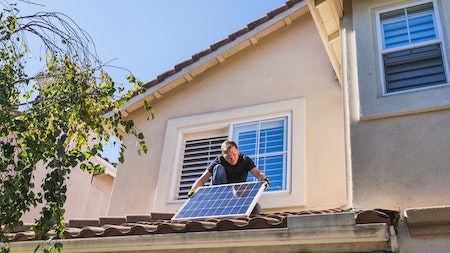With the shock announcement of a pending hefty power price increase, the added burden of the recent interest rate hike and predictions of at least one more this year, consumers whose budgets are already stretched are increasingly concerned about their future financial survival. Such impacts make a strong case for solar solutions, but with a somewhat hefty initial outlay for installation, it may appear as though it is an unaffordable option.
“Not so,” says Portia Letlape, Product Portfolio Manager of Existing Customer Management (ECM) and Rewards at Absa Home Loans. “For homeowners who can’t, or prefer not to, spend money upfront to finance the installation of solar, Absa has financing solutions, and the beauty of it is that such a loan can be paid back over time, with energy savings.”
How solar works
Energy expenditure savings is precisely the point with solar. This is achieved by using natural radiation from the sun - which is in effect free - and converting it into electricity. A typical installation comprises many components. The major ones are the solar PV panels that capture sunlight, a storage facility such as batteries, re-wiring of the home, a charge regulator/controller, and a battery inverter that converts the power into a usable domestic form. This may sound technical, but actually, it’s a relatively simple process.
Solar PV panels, usually mounted on roofs, absorb the sun, and the more the panels are exposed to direct natural light, the more DC electricity is produced. However, DC electricity is not compatible with the electricity found in homes or offices. Therefore, special equipment, called inverters, is needed to convert the DC electricity from the PV cells into alternating current (AC) electricity, a form of power that can be used domestically.
Letlape explains that this solar system is based on a renewable energy system and moves a household away from dependence on the country’s power grid, which Eskom operates. The power grid itself predominantly depends on non-renewable energy sources like coal, which is not environmentally-friendly given the emissions produced when burning it to operate power stations. With solar, there are no such concerns, and anyway, the move to more renewable energy sources is in line with the country’s goal to reform the energy sector.
Costs
“Another consideration is energy costs, and we have to factor into the decision-making process the fact that electricity prices of national grid power have increased three-fold over the past decade. These are expected to increase more than 15% annually at the current rate. Load shedding, introduced because of power stations’ continual decline due to lack of maintenance, further exacerbates the problem. With the current trend to work from home as much as possible, homeowners are now having to absorb the costs of additional energy use that would have been their employer’s burden.
“While these reasons alone make a strong case for solar, which some years ago seemed beyond the reach of ordinary citizens due to high installation costs, the ongoing declining price of solar panels and batteries is now piquing new interest. Solar is now considered as an extremely viable option given their ability to generate electricity for up to 25 years!” says Letlape.
Solar systems’ upfront costs ultimately pay for themselves. The return on investment is calculated on a case-by-case basis but is generally offset by the electricity not being consumed from the national power grid. Thus, the savings will ultimately pay for the installation, whether the whole or only part of the home - or even just the geyser operate - on solar. A further attraction is that excess solar energy can be sold to municipalities or shared.
Letlape says that when comparing the overall cost savings of solar against the cost of repaying a loan for a solar installation, there is often a strong case for solar if the finance is structured correctly.
Not nearly as effective as a complete solar solution is the acquisition of an Uninterrupted Power Supply unit (UPS). It basically runs on batteries that do need to be kept charged. When a municipal interruption to power or load shedding is in effect, a UPS can be depended on to run several appliances and technology for a few hours.
Absa financing solutions
“You may need to borrow the financial resources for an energy installation, and Absa has a number of solutions that can assist,” says Letlape.
If you have a home loan account, you can tap into the increased value of your property by accessing any additional funds from your home loan through a Further Advance. This increased value is paid out in cash and can therefore be used to purchase a solar system. However, it’s important to note that Bond registration costs are payable.
Another way is Re Advance, which allows you to apply for the difference between your outstanding balance on your home loan and your original loan amount, and this is paid to the homeowner in cash. There is no need to register a further bond with the deeds office, so bond registration costs are not applied.
“At Absa, we also have the Multiplan that allows a customer to structure their loan amount on a secondary account. You can choose the term of your loan which allows for the benefit of paying off a solar solution in a shorter period,” adds Letlape
Flexi Reserve is advantageous to those who have paid more than the monthly home loan instalment over time, which means they already have pre-paid funds available. Another alternative, which applies when you have a loan with a bank other than Absa, is to switch over this loan to Absa, whereby equity on your property can be accessed, or you may apply for the additional funds to be paid to you in cash.
For customers who don’t have home loans or don’t want to access their equity, a personal loan or credit card may be considered options.
“Alternatively, you may want to use a savings account and save towards a solar solution,” says Letlape. “The advantage of paying for solar in cash is that this maximises your long-term savings because you don’t have additional interest rate charges to pay towards your borrowed amount. You will also be protecting yourself against future rising utility costs and inflation. But, of course, this may not always be possible for most households.
“With a loan, the key benefit is borrowers have more flexibility with their budgets while maintaining the benefits of solar system ownership, which in turn provides peace of mind when load shedding schedules commence.
“Absa has long been committed to creating customer-centric products that recognise that sustainable living is a priority for its customers. Therefore, we are excited by eco-friendly solutions that not only assist our customers to save money but also support the country’s renewable energy agenda,” concludes Letlape.





